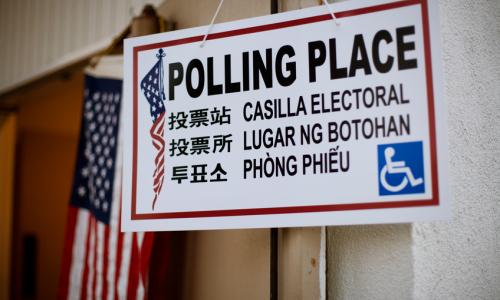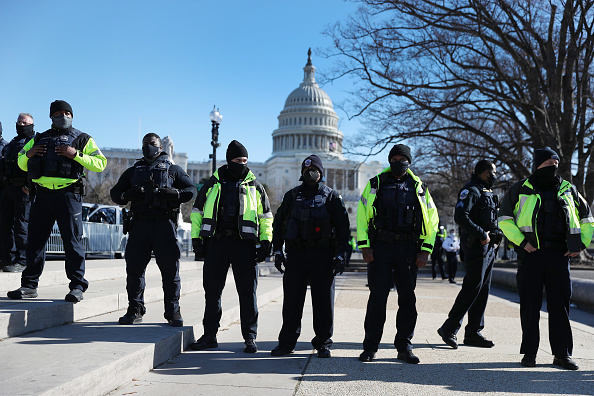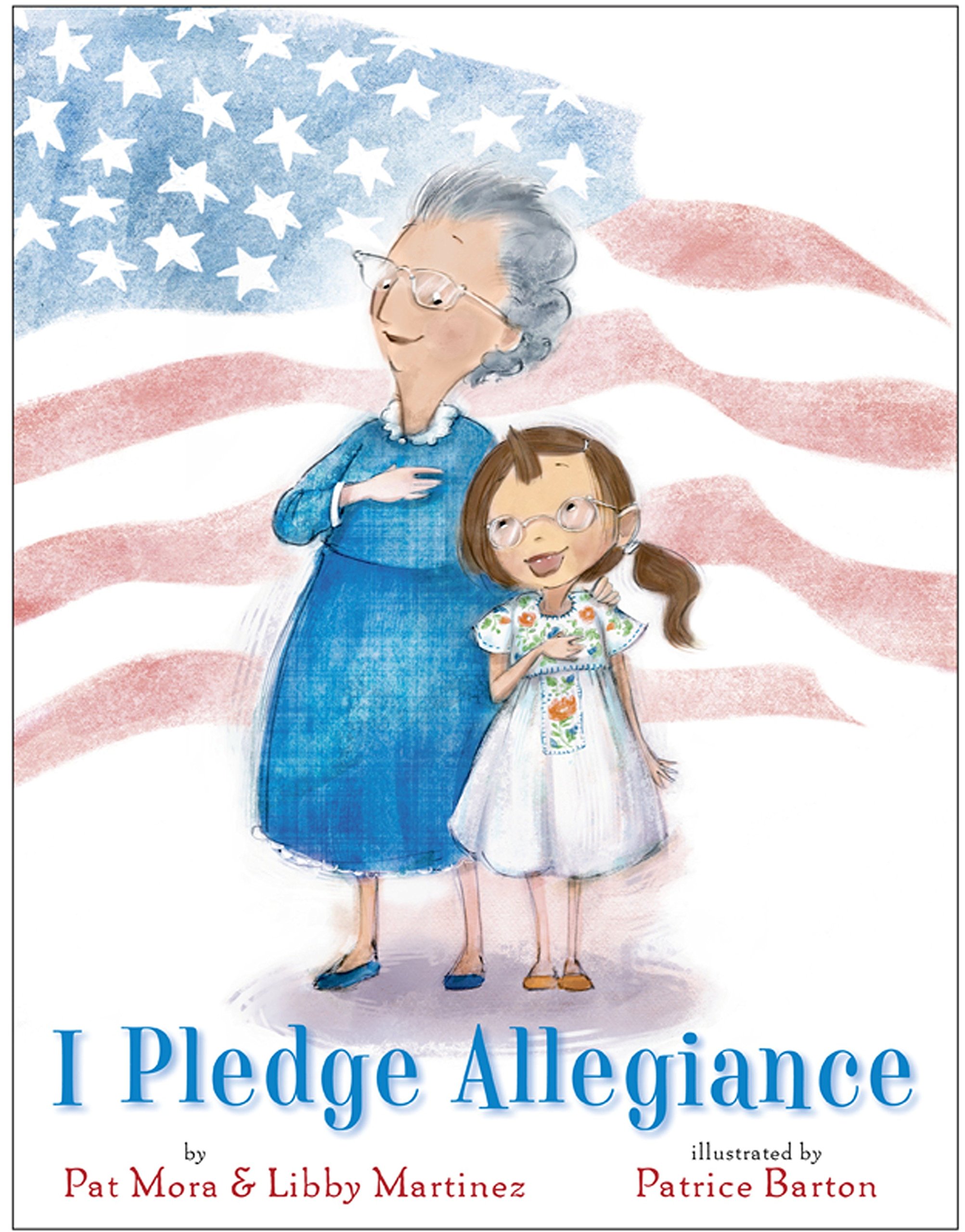The 2022 Election and Beyond: Resources for ELLs

Find resources for didactics and discussing the 2022 election and subsequent events with your English linguistic communication learners (ELLs) in the resource list below, as well as resources focused on media literacy.
These resource about the 2022 Election and subsequent events, including the insurrection at the U.S. Capitol, include educational resources yous tin can utilize in the classroom and tips for discussion with English linguistic communication learners (ELLs) and immigrants.
Special cheers to Larry Ferlazzo for maintaining great resource lists and archives on these topics.
Insurrection at the U.Southward. Capitol: Resource for Educators
 We are compiling classroom resources about the events of January 6, 2022 at the U.S. Capitol equally they go available.
We are compiling classroom resources about the events of January 6, 2022 at the U.S. Capitol equally they go available.
Making Space: Educational activity After Trauma
In this Edutopia piece, Dr. Tracy Edwards writes, "Although the urge to immediately set up, teach, or somehow solve problems for our students may exist strong, nosotros must hold space for reflection, honest dialogue, and questions as they arise."
Discussing political violence with ELLs, immigrants, and refugees
If yous are discussing these events with ELLs and immigrant students, please keep in mind that these events will take a lot of time for students and educators alike to process. Students may likewise have questions about how the police response to the events at the Capitol compares to responses to racial justice protests. In addition, keep in mind the post-obit:
These events may exist particularly traumatic for students who have endured armed conflict, civil war, unrest, and violence in their abode country. That violence may exist the reason they came to America, and they may have many opinions and questions nigh current events. Students may also have personal questions and considerations nearly their own prophylactic or that of their families for a diversity of reasons.
- Consider providing students a private space to share their thoughts, such as a digital journal.
- Prepare for these discussions in collaboration with counselors and other mental wellness professionals.
- Larn more than near trauma-informed instruction for immigrant students.
See more than in the following:
- For Some New Americans, Capitol Assail Was an Repeat of Turmoil They Hoped to Escape (NPR)
ELL/immigrant students and their families need to know that they are valued members of your class, schoolhouse, and community.
- Keep efforts to brand them feel welcome.
- If you lot aren't sure what that looks like in virtual settings, ask them what would make them experience more welcome, perhaps in individual conversations or pocket-sized focus groups.
- Share those ideas with colleagues and administrators as y'all hear them.
ELLs may face up additional bullying or harassment in coming weeks and months.
- Communicate to your class that all students are valued members of the classroom and bullying or disrespectful speech communication, including confronting ELLs and immigrant students, will non exist tolerated.
- Share the importance of these message with other colleagues.
- Come across helpful ideas in 8 Tips to Protect ELLs from Bullying in Your Classroom and School.
Students may have deep personal feelings about the outcomes of the 2022 election for a number of reasons.
Some of these reasons include the post-obit:
- ELL and immigrant students may have felt the impacts of changing immigration policies in contempo years, directly or indirectly.
- They may also have experienced bullying or harassment due to a number of factors, including their ethnicity, language, or organized religion.
- Many immigrant families have too been peculiarly vulnerable during the COVID-19 pandemic and students may exist shouldering heavy levels of responsibleness at home.
- Students may also exist concerned about retribution against themselves based on the outcome of the election.
In your educational activity:
- Remember that some students may not wish to discuss these events right abroad. Students may need time, space, and privacy to process what is unfolding. And, like teachers, many students are exhausted. Finding positive things to focus on and letting students know that you are at that place to heed when they are ready is an of import first stride. (See more than on this topic from Dr. Tracy Edwards' related Twitter thread.)
- Proceed with utmost intendance and sensitivity. Look for ways to embed social-emotional support and learning across the curriculum. While some students may wish to appoint in group discussion, others may experience uncomfortable drawing any attention to themselves or their family's situation.
- Consider reaching out to administrators and mental health colleagues or partners to establish some more robust support for students who are under tremendous strain due to the pandemic and perchance feeling loftier levels of feet.
- Avoid making assumptions about any educatee's experience or political leanings.
- Explain that the long procedure of counting votes later on the ballot proceeded equally normal and was expected, peculiarly with the loftier number of mail-in ballots this twelvemonth due to the pandemic.
Run into more in the following resources:
- Embedding Social-Emotional Learning for ELLs Across the Curriculum in Any Learning Environment
- Providing Social-Emotional Support for Immigrant Students
Students and families may have questions nigh what the ballot and current events might mean for them.
- Speak with students and families directly to discover out their concerns.
- Admit the difficulty of the uncertainty families have been experiencing.
- Detect out which local organizations have ties to your community.
- Await for ways to provide ongoing updates of information in families' home languages. Edifice schoolhouse-customs partnerships have proven to be critical in addressing families' questions and concerns about the pandemic, immigration bug, and other central topics.
- Don't lose sight of the strengths that ELL/immigrant students and families bring to their schools and our communities every day. The better you know your families, the more deeply you can tap into those strengths.
See more tips hither:
- Addressing Immigrant Families' Questions and Concerns
- Connecting Immigrant Families with Legal Back up and Advice
Run into additional tips and resources for discussing the 2022 election with student below.
Lesson plans and articles
Looking Back at Jan. vi, 2021
- Resources for Educators: January six, 2022 (PBS NewsHour Classroom)
- 8 ways teachers are talking nearly Jan. vi in their classrooms (NPR)
- Opinion: My Students Withal Accept Questions About the Capitol Riot. They Deserve Honest Answers (Educational activity Calendar week)
Instruction the events of Jan. 6, 2021
- How to Engage Students in Civil Discourse Following Events at the U.South Capitol (PBS NewsHour Extra)
- Classroom Resource: How to Teach the Insurrection at the Capitol (PBS NewsHour Extra)
- Zoom chat: How to Have a Conversation with Your Students About the Insurrection at the U.S. Capitol (PBS NewsHour Extra)
- How Police Responded at the Capitol and During Racial Injustice Protests (PBS NewsHour Extra)
- This Moment in Time: Navigating Unprecedented Historical Events (Share My Lesson)
- What Teachers Are Planning to Teach Well-nigh the Events of Jan 6, 2022 (The Washington Post)
- Insurgency at the U.S. Capitol: A Dreaded, Existent-Life Lesson Facing Education (Education Week)
- Responding to the Insurrection at the U.Southward. Capitol (Facing History)
- Violent Mob Storms the Capitol, Tries to Overturn the Ballot (Newsela)
In improver to these resources, learn how other educators are managing this moment through your local networks or online networks.
Resource lists
- Ways to Teach Near the Capitol Insurrection (Larry Ferlazzo)
- How to Teach the U.Southward. Capitol Attack: Dozens of Resources to Get You Started (Education Week)
- Jan vi, 2021: Resources for Educators (NYC Section of Education and Civics for All)
Student opinion
- What Are Your Reactions to the Storming of the Capitol? (The New York Times)
About the U.South. Capitol
- The U.S. Capitol: Lesson Plans (U.S. Capitol Visitor Center)
- A Landmark Lesson: The U.S. Capitol Building (EDSITEment!)
- Virtual Tours and Altitude Learning Resources: U.S. Capitol (Builder of the Capitol)
- Capitol vs. Capital: How to Cull the Right Word (Thought.co)
Responding to trauma
- Caring for Students in the Wake of a Traumatic News Result (Educational activity Week)
- When Bad Things Are Happening (Education Tolerance)
- Secondary Traumatic Stress: Resources for Educators (National Child Traumatic Stress Network)
Resources for families
- Talking to Kids well-nigh Violence at the U.Southward. Capitol (Mutual Sense Media)
- How to Talk to Kids Almost Riots at the Capitol (NPR)
- How to Talk to Your Children About Events at the Capitol (National Geographic)
- How to Talk with Your Kids Almost Violence at the Capitol (Denver Post)
Talking about tough topics in the news
- Helping Children Cope Afterward a Traumatic Event (Child Mind)
- Helping Children with Tragic Events in the News (PBS Parents)
- When Something Scary Happens (PBS Parents)
- Parenting for a Challenging Earth: Recovery Subsequently a Traumatic Event (National Child Traumatic Stress Network)
- Explaining the News to Our Kids (Common Sense Media)
Resources in Castilian
- Cómo hablar con los niños sobre la violencia en el Capitolio de los Estados Unidos (Common Sense Media)
- Los eventos en el Capitolo de Washington (BBC News Mundo)
- El mundo mira a la violencia en el Capitolio (CNN en español)
- 15 consejos para hablar sobre la violencia
Related resources
- Talking Nearly Racism and Violence: Resource for Educators and Families
- Lesson Plans on Race, Ceremonious Rights, and Charlottesville
- 15 Tips for Talking with Children About Violence
Media Literacy
Archived events
- Twitter chat: How can the journalists of today help the historians of tomorrow? (PBS Student Reporting Labs)
- Webinar: How to Teach Mail-Ballot and Work Towards Unity (PBS NewsHour Actress)
Articles & web log posts
- Time to Boost Media Literacy (Facing History)
- Fostering Civil Discourse: How do we talk about issues that thing? (Facing History)
- The U.S. Election Underscores the Demand for Instruction News Literacy in Our Schools (EdSurge)
- Digital Literacy in the Classroom (Education Tolerance)
Classroom Resource: Election 2020
After the Election
- 2020 Election Coverage (PBS NewsHour)
- Super Civics 2022 (PBS NewsHour Actress)
- Educatee Opinion: What is your reaction to the results of Election 2020? (The New York Times)
Immigration stories and topics
- Irish gaelic Home of Biden'southward Smashing-Great-Peachy Grandfather Cheers His Victory (The New York Times)
- Every bit Kamala D. Harris Breaks Barriers, India and Jamaica Celebrate (The Washington Post)
- Six immigration problems Biden may accept on (Reuters)
Election Week: Waiting for Results
- During election calendar week like no other, teachers assistance students brand sense of it all (The Washington Post)
- Social studies teachers plough election uncertainty into teachable moment (National Council on Social Studies)
- Navigating November 4th (Facing History)
- What to Hash out with Students After the Election (PBS NewsHour Extra)
- What Is the AP and How Practice Outlet Phone call Results? (PBS NewsHour Extra)
- How Mail Votes Could Filibuster Election Results (The New York Times)
Preparing for the 2022 Election
- What I'll Say to My History Class If There Is No Clear Winner on Election Night (Education Week)
- How Tin can Teachers and Students Discuss the 2022 Election? (Teaching Channel)
- Pedagogy the 2022 Election: What Volition You Practice on Midweek? (Educational activity Tolerance)
- Classroom Q&A with Larry Ferlazzo: 4-Office Series on Politics in the Classroom (Education Week)
- Day After Election Guide (Virginia Eye for Inclusive Communities)
- Instruction About the 2022 Presidential Election (National Council for Social Studies)
- Permit'southward Talk Nigh Election 2022 (KQED Learn)
- Resources for the 2022 Election (Larry Ferlazzo'due south Best Websites of the Day)
- 2020 Election: Learning Program (Teaching Tolerance)
Multimedia: 2022 Election & Civics Resources for Students
- Talking with Young Kids Virtually Elections, Voting, and Justice for All (PBS Kids)
- Turning Out: The Youth Vote (NewsHour Student Reporting Labs)
- iCivics: 2022 Ballot Headquarters (Encounter iCivics resources and games bachelor in Castilian)
- National Student/Parent Mock Election: Voter Education Portal Teaching Materials
- Ballot Day Videos for Students (Just Kinder)
- Our White Firm: Looking In, Looking Out
- Civics in Existent Life (Florida Joint Center for Citizenship)
Resources for ELLs
- Newsela: Bilingual news articles at different reading levels and Common Cadre-aligned quizzes
- Listenwise: Current Events & Election Podcasts
- Video for ELLs: How Congress Works (Vox of America, via Larry Ferlazzo)
- CNN ten (CNN)
Spanish-Language Election Information
- USA.gov: Voting Information in Castilian
Useful Resources from Prior Elections
- viii Questions for Nate Argent (Time for Kids)
- Five Means to Support Undocumented Students During Election Season (Didactics Tolerance)
- Don't Count Them Out Just Considering They Can't Cast a Election (NPR)
- Civil Chat Claiming for Teenagers (The New York Times)
- Speak Up for Civility (Teaching Tolerance)
- Bias in the Presidential Ballot (Tabular array Talk parent/family discussion guide)
- Education World: Primaries, Voting, and Elections
- ReadWriteThink: Ballot Lesson Plans
Books & Authors
My America: Many Voices, Many Stories
 These books celebrate a diverse range of American voices and experiences, including voting in an election, immigrating to this country, and the journey to becoming a U.S. citizen.
These books celebrate a diverse range of American voices and experiences, including voting in an election, immigrating to this country, and the journey to becoming a U.S. citizen.
Featured Video: Janet Wong reads "Liberty"
Poet Janet Wong reads and discusses her poem "Liberty", which is featured in Poems to Acquire by Heart.
Source: https://www.colorincolorado.org/books-authors/literacy-calendar/election-day-resources-ells
0 Response to "The 2022 Election and Beyond: Resources for ELLs"
Post a Comment